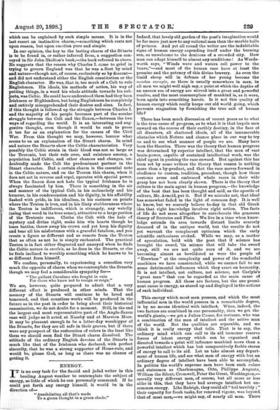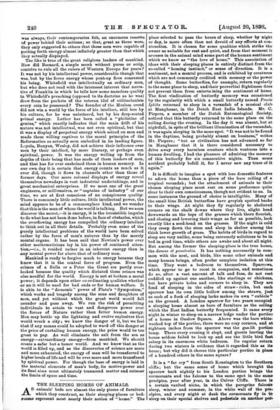ENERGY.
IT is no easy task for the flaccid and jaded writer in this broiling August weather to contemplate the subject of energy, so little of which he can personally command. If he could put forth any energy himself, it would be in the direction of—
"Annihilating all that's made To a green thought in a green shade."
Indeed, that lovely old garden of the poet's imagination would be far more just now to any rational man than the marble halls of princes. And yet all round the writer are the indubitable signs of human energy expending itself under the burning sun, so unwelcome to the denizens of a crowded city. How man can adapt himself to almost any conditions ! As Words- worth says, "Winds wave and waters roll power to the brave,"—and most of the human race have at least the promise and the potency of this divine bravery. As even the timid sheep will in defence of her young become the 7)zovton enragee, so there is usually somewhere in man, in all men we might well nigh say, a point at which the depths of an unseen sea of energy are stirred into a great and powerful resolve, and the most commonplace of mankind is, as it were, born again into something heroic. Is it not this quality of human energy which really keeps our old world going, which prevents stagnation by furnishing the true salt of human life ?
There has been much discussion of recent years as to what is the true cause of progress, as to what it is that impels men onward on the course of their earthly destiny, in the face of all disasters, all shattered ideals, all of the innumerable obstacles which Nature and chance place in our way to try us and to see what manner of people we are. Many have been the theories. There was the theory that human progress was determined by superior intellect, that the man of vast brain-power, capable of sustained intellectual work, was the chief agent in pushing the race onward. But against this has been set by some writers the theory that reason is nothing more than a by-product, and that the race moves forward in obedience to custom, tradition, precedent, though how those customs arose and embraced whole races in their wide grasp has not been clearly shown. There is the theory that culture is the main agent in human progress,—the knowledge of the beat that has been thought and said, as the apostle of culture, Mr. Arnold, put it. But if we mistake not, that ideal has somewhat faded in the light of common day. It is well to know, but we scarcely believe to-day in that old Greek idea that right knowledge involves right action. The facts of life do not seem altogether to corroborate the generous theory of Socrates and Plato. We live in a time when know- ledge extends its area towards distant limits scarcely dreamed of in the antique world, but the results do not yet warrant the complacent optimism which the early scientific enthusiasm evoked. While we may, as a matter of speculation, bold with the poet that if science has brought the sword, 'tis science that will take the sword away, still we are not quite sure of it, and we are becoming almost as bewildered as were the people of "Erewhon " at the complexity and power of the wonderful machines we have constructed, while we cannot fail to see some detrimental influences which they exert on humanity. It is not intellect, not culture, not science, not Carlyle's "great man" that can be regarded as the main cause of human progress. All these are factors, but the one promi. nent cause is energy, as stored up and displayed in the actions of each individual.
This energy which most men possess, and which the most influential men in the world possess in a remarkable degree, is by no means identical with intellect. When, indeed, the two factors are combined in one personality, then we get the world's giants,—we get a Julius Ca3sar, for instance, who was a combination of the man of intellect and the active man of the world. But the qualities are separable, and we think it is really energy that tells. That is to say, the ordinary mind which can call to its aid immense reserve forces of latent energy which can be organised and directed towards a point will influence mankind more than a. powerful intellect which has but comparatively feeble stores of energy to call to its aid. Let us take almost any depart- ment of human life, and see what men of energy with but an ordinary degree of intellect have been able to accomplish. In politics the world's supreme men have been such rulers and statesmen as Charlemagne, Otto, Philippe Auguste, William the Silent, Cromwell, Peter the Great, Washington,— morally very different men, of coarse, but all more or less alike in this, that they have had average intellect but un- common energy. Like Raleigh, they could all " toil terribly ; " their capacity for fresh tasks, for renewed vigour, was beyond that of most men,—we might say, of nearly all men. There
was always, their contemporaries felt, an enormous reservs of power behind their actions; BO that, great as these were, they only suggested to others that these men were capable of putting forth energy almost infinitely greater than that which they actually displayed.
The like is true of the great religious leaders of mankind. How did Bernard, a simple monk without parse or scrip, contrive to rule all the rulers of Western Europe for years P It was not by his intellectual power, considerable though that was, but by the fierce energy whose pent-up fires consumed his being. Whitefield was intellectually an ordinary man, but who does not read with the intensest interest that narra- tive of Franklin in which he tells how some nameless quality in Whitefield's preaching (opposed to its doctrine as he was) drew from the pockets of the veteran idol of utilitarianism every coin he possessed ? The founder of the Moslem creed did not win a world by the force of his intellect, still less by his culture, for he was unlettered, but by his deep-seated primal energy. Luther has been called a "philistine of genius," which exactly indicates that the main drift of his nature was not intellectual, was not even spiritual, but that it VMS a display of perpetual energy which seized on men and made them willing captives to the moral principles of the Reformation as actually seen embodied in its leading figure. Loyola, Bunyan, Wesley, did not achieve their influence over men by their intellect, by mere literary, or perhaps even spiritual, power. It was the energy welling up from the depths of their being that has made of them leaders of men, and that has for ever enshrined them in human memory. In our own day it is certain that energy counts as much as it ever did, though it flows in channels other than those of former days. Our more colossal displays of energy reveal themselves nowadays in vast industrial undertakings, and in great mechanical enterprises. If we meet one of the great engineers, or millionaires, or "captains of industry" of our time, we are at first conscious of no conspicuous quality. There is commonly little culture, little intellectual power, the mind appears to be of a commonplace kind, and we wonder that this is the man of whom the world is talking. But we soon discover the secret,—it is energy, it is the irresistible impulse to do what has not been done before, in face of obstacles, which the overflowing energy has compelled the ordinary intellect to think out in all their details. Probably even some of the purely intellectual problems of the world have been solved rather by the force of men's natures than by the merely mental organs. It has been said that Newton's power over ether mathematicians lay in his power of continued atten- tion,—i.e., it resided rather in an inherent energy than in .any mental power far above that of ordinary men.
Mankind is ready to forgive much to energy because they know that it is the central force of progress. Even the crimes of a Sulk or a Peter the Great are partly over- looked because the quality which dictated nose crimes was also needful for the world. Energy is not at bottom a moral power; it depends upon other co-ordinating qualities whether or no it will be used for bad ends or for human welfare. It is akin to the " dmonic " power of Plato's "Symposium," which works sad tragedy among the sons and daughters of mien, and yet without which the great world would fall asunder and pass away. We run the risk of permitting individuals to attain to vast and dangerous power over the forces of Nature rather than fetter human energy. Men may bottle up the lightning and evolve explosives that would wreck a city ; we know the danger of it, but we feel that if any means could be adopted to ward off this danger at the price of curtailing human energy, the price would be too 1 great to pay. As well eliminate the salt from the sea as energy—extraordinary energy—from mankind. We should create a safer but a tamer world. And we know that as the world is filled up, and as the discoveries of science are more and more exhausted, the energy of man will be transferred to higher levels of life and will be ever more and more transfused by spiritual power. For though the base of energy is laid in the material elements of man's body, its motive-power and its final aims must ultimately transcend matter and outsoar the limits of space and time.



































 Previous page
Previous page